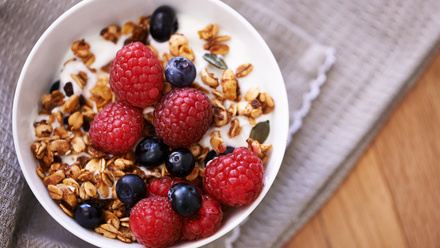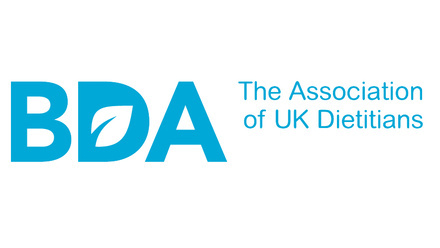It’s time to give your baby more than milk
For most babies, breastmilk or infant formula can meet their needs for growth until about six months of age. After that, complementary solid foods are needed. Solid foods are introduced gradually so babies get used to new tastes and textures. By about one year of age, most babies will be eating a variety of family foods.

Why do babies need solids?
Babies grow more quickly during their first year than at any other time and need enough energy and nutrients to allow this rapid growth. By six months, milk alone may not provide enough nutrition for most babies to grow well and solid foods should be given; they also encourage biting and chewing which is important to develop the muscles around the mouth needed for speech. Giving the right foods at this time lays the foundation for healthy eating throughout life.
When should I introduce solids?
Signs that your baby is ready for solids include when they:
- can reach out and grab things, bringing them to their mouth
- start chewing their toys
- can sit up with some or no support and control their head
These behaviours can be mistaken for signs that your baby is ready for solids:
- putting their fists in their mouth
- higher demand for milk feeds
- waking up more than usual during the night
These normal behaviours do not always mean your baby is hungry or ready to start solid foods.
Each baby is different. Some may be ready to start food a little earlier than others. Solids should only be given when your baby is ready and not before 17 weeks of age. Readiness may be harder to recognise in babies born early (before thirty-seven weeks). Your dietitian or health visitor can help you with this.
You can carry on breastfeeding while introducing solid foods. Breastfeeding is beneficial for you and your baby and can be continued to two years of age and beyond if you wish.
Stages of solid feeding
Traditionally, solid foods are introduced in stages, gradually moving towards the family’s diet, as shown in the table below. The age at each stage varies for each baby.
You may prefer to offer finger foods first and allow your baby to feed themselves. This is called ‘baby-led weaning’. When this approach is done well it can be safe and provide enough nutrition for growth.
Finger foods are foods cut up into pieces your baby can hold in their fist with some of the food sticking out at the top, which they can bite off and chew. The pieces of food should not be so small that they cause your baby to choke. A piece about the size of your own finger is a rough guide.
When giving finger foods make sure they are soft enough to eat. Hard vegetables and fruit should be cooked to soften them. Remove pips, stones and hard skin. From nine to twelve months, firmer finger foods can be offered.
|
Stage |
Age range |
Consistency and frequency |
|
1 |
Around six months |
Small amounts of pureed or blended foods offered once daily |
|
2 |
Six to nine months |
Thicker consistency with some lumps; mashed, chopped. Soft finger foods. Three meals daily |
|
3 |
Nine to 12 months |
Firmer foods. Three meals daily followed by fruit or plain yoghurt
|
|
4 |
12 months plus |
Family foods (without added salt and sugar) as three meals with healthy snacks in between e.g. vegetable sticks, slices of fruit, crackers, bread sticks |
Foods from all groups to be included:
- Vegetables and fruits
- Baby rice, potatoes (including sweet potatoes), yam, pasta, bread, oats and breakfast cereals
- Meat, fish, lentils, beans, eggs and tofu (soy)
- Plain yoghurt and cheese
- Ground nuts and nut butters mixed in food
What kind of foods should be used?
The Department of Health recommends vegetables, baby rice mixed with milk, and fruit as first foods. Bitter-tasting vegetables are often the most difficult to accept, so including them early can help your baby get used to them. When your baby is ready, an increasing variety of foods can be offered including iron-rich foods (e.g. meat, fish and pulses).
It is important to offer different tastes and textures and to recognise that babies may need to try a new food many times before they accept it. Delaying the introduction of a new taste or texture, especially beyond six to twelve months, may take a baby longer to accept it.
All parents and caregivers should check if they qualify for free Healthy Start vouchers to buy milk, fruit and vegetables.
Is it okay to use commercial baby foods?
It is best to offer home-prepared foods, based on foods that the family eat, without added salt and sugar. Commercial baby foods can be included as part of a varied diet occasionally for convenience. Babies who only eat commercial baby foods may get used to their taste and not like the family foods offered.
What about the following foods?
Salt
Salt should not be added to food and salty foods, such as bacon, cheese and some processed foods, should be limited.
Sugar
Avoid foods and drinks that are high in sugar, and do not add any sugar to foods and drinks.
Honey
Babies under one year should not be given honey. It may contain bacteria that could cause an infection.
Nuts
Babies can have nuts, finely ground or in food as a smooth paste (e.g. nut butter). Children under five years old should not have whole nuts because of the risk of choking and inhalation.
Eggs
Eggs, without a safety mark (red lion stamp or “British Lion Quality”) should be cooked until both the white and yolk are solid.
Is it safe to give a vegetarian or vegan diet?
Children can grow and develop normally on a vegetarian or vegan diet, but more attention to the foods they are eating is needed to make sure their nutritional needs are met. Vegan children will also need vitamin B12 supplements. Speak to your dietitian or health visitor for advice.
What about drinks?
Breastfed babies do not need any additional drinks; continue to offer your baby regular breastfeeds. If formula feeding your baby, offer 500-600ml/day. Formula-fed babies may need extra water (boiled, then cooled) in hot weather.
Cow’s milk can be introduced as a main drink from one year of age. Plant-based milks are not nutritionally adequate for infants as their main milk in the first year of life. From one year of age fortified plant-based milks can used in preparing foods and given as the main milk drink.
Fruit juice is not recommended for children under the age of one.
Does my child need supplements?
Yes, click here for the NHS guide on vitamins for children.
All parents and caregivers should check if they quality for free Healthy Start vitamin drops. For further information click here.
Source(s)
BDA. Breastfeeding Policy Statement. 2018.
Scientific Advisory Committee Nutrition. Feeding in the First Year of Life. 2018.2.
World Healthy Organization. Complementary feeding of young children in developing countries: a review of current scientific knowledge. 1998.
World Health Organization. The optimal duration of exclusive breastfeeding: report on an expert consultation. 2001.
Lennox A SJ, Ong K et al. Diet and Nutrition Survey of Infants and Young Children (2011). 2013.
Scottish maternal and infant nutrition survey. Scottish Government. 2018.
Fewtrell M BJ, Campoy C, Domellöf M, Embleton N, Fidler Mis N, Hojsak I, Hulst JM, Indrio F, Lapillonne A, Molgaard C. Complementary Feeding: A Position Paper by the European Society for Paediatric, Gastroenterology, Hepatology, and Nutrition (ESPGHAN) Committee. Journal of Paediatric Gastroenterology and Nutrition. 2017;64(1):119-32.
Responsive Feeding Info Sheet. UNICEF. Accessed 1st May 2020: https://www.unicef.org.uk/babyfriendly/wp-content/uploads/sites/2/2017/12/Responsive-Feeding-Infosheet-Unicef-UK-Baby-Friendly-Initiative.pdf.
Du Toit G, Sayre PH, Roberts G, et al. Effect of Avoidance on Peanut Allergy after Early Peanut Consumption. New England Journal of Medicine. 2016;374(15):1435-43.
Perkin MR, Logan K, Tseng A, et al. Randomized Trial of Introduction of Allergenic Foods in Breast-Fed Infants. New England Journal of Medicine. 2016;374(18):1733-43.
Carlo Agostoni RBC, Susan Fairweather‐Tait, Marina Heinonen, Hannu Korhonen, Sébastien La Vieille, Rosangela Marchelli, Ambroise Martin, Androniki Naska, Monika Neuhäuser‐Berthold, Grażyna Nowicka, Yolanda Sanz, Alfonso Siani, Anders Sjödin, Martin Stern, Sean Strain, Inge Tetens, Daniel Tomé, Dominique Turck and Hans Verhagen. Scientific Opinion on the essential composition of infant and follow-on formulae. EFSA Panel on Dietetic Products. 2014.
Luyt D, Ball H, Makwana N, et al. The British Society for Allergy and Clinical Immunonology Guideline for the Diagnosis and Management of Cow's Milk Allergy. The British Society for Allergy and Clinical Immunonology. 2014.
Scientific Advisory Committee on Nutrition, Vitamin D and Health. 2016.
Foods and drinks aimed at infants and young children: evidence and opportunities for action. Public Health England. 2019.






